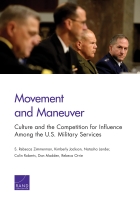by S. Rebecca Zimmerman
 What cultural characteristics, primary goals, and competitive strategies and tactics are exhibited by the Army, Navy, Air Force, Marine Corps, and U.S. Special Operations Command? How might each of the services and U.S. Special Operations Command adapt and respond if it faced major policy shifts in the future, specifically in the Asia-Pacific?
What cultural characteristics, primary goals, and competitive strategies and tactics are exhibited by the Army, Navy, Air Force, Marine Corps, and U.S. Special Operations Command? How might each of the services and U.S. Special Operations Command adapt and respond if it faced major policy shifts in the future, specifically in the Asia-Pacific?
This report analyzes the current character of competition between the United States Army, Navy, Air Force, Marine Corps, and U.S. Special Operations Command (USSOCOM) and examines how culture impacts the ways the services posture themselves to gain resources, authorities, access, and influence. The report identifies cultural characteristics, primary goals, and competitive strategies exhibited by the military services and USSOCOM. Further, it explores the current modalities of competition and tactics of competition employed by each service. The authors evaluate whether the cultures of the services have changed substantively over time and whether the services wield as much influence as they did before the Goldwater-Nichols Department of Defense Reorganization Act of 1986. Finally, the authors assess how each service might adapt and respond if it faced major policy shifts in the future, focusing specifically on contingencies in China and North Korea. The authors make three essential arguments:
First, service personalities are alive and well. They endure, but they also evolve slowly to allow adaptation to the present environment. Second, post–Goldwater-Nichols, services remain the most powerful organizational actors in national defense. However, their relative edge over the Office of the Secretary of Defense, combatant commands, and the Joint Staff has decreased, leading to a more complex field of competition. Third, this complexity introduced by Goldwater-Nichols has created changes to the character of competition in the national security arena. The relevant actors have expanded to include elevated roles for the Marine Corps and USSOCOM, and the tactics and arenas of competition have changed.
No comments:
Post a Comment